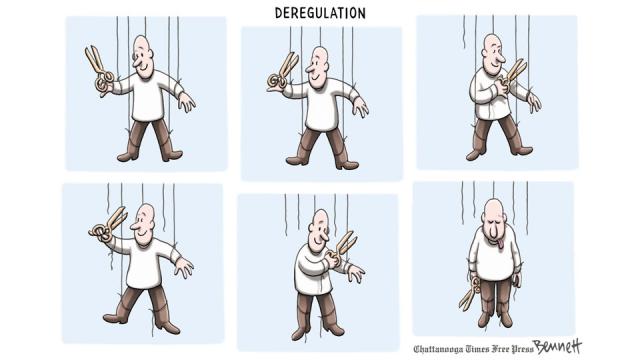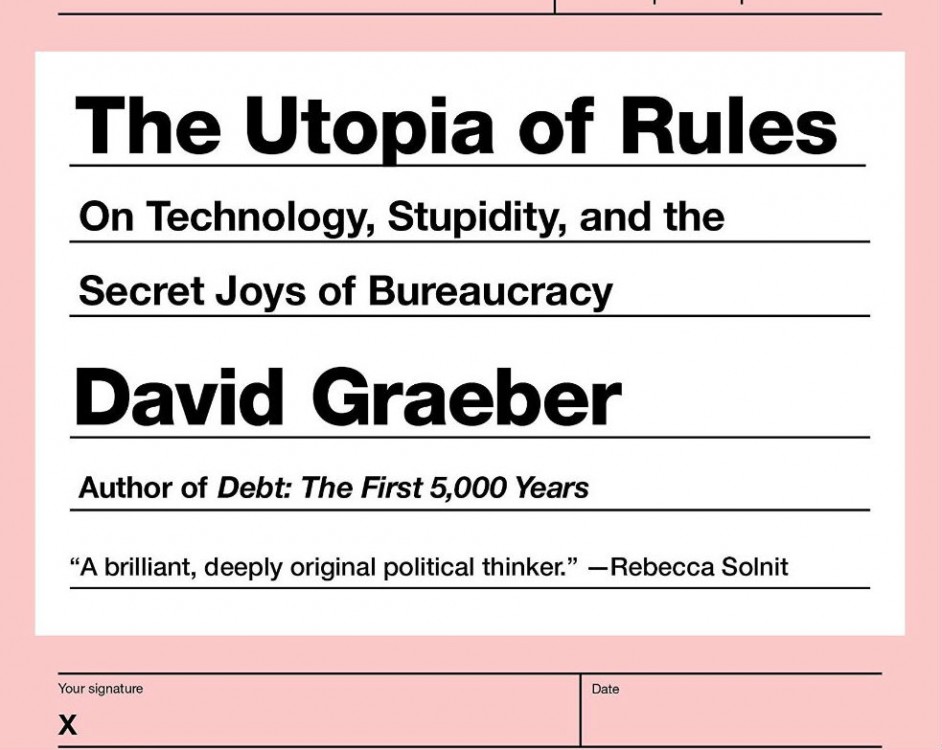
The current economic system advances through free trade and deregulation; the American Dream has been outsourced globally. This has created a bureaucratic nightmare, asserts David Graeber in his latest book, The Utopia of Rules: On Technology, Stupidity and the Secret Joys of Bureaucracy.
Graeber, whose best-selling 2011 book, Debt: The First 5,000 Years, looked at the historical relationship between debt and social institutions, says in his current work that there is an "iron law" of liberalism: “Any market reform, government initiative intended to reduce red tape and promote market forces will have the ultimate effect of increasing the total number of regulations, the total amount of paperwork, and the total number of bureaucrats the government employs.”
The corporate narrative maintains that governments are to blame for all the red tape. This message is central within the rightwing's critique of bureaucracy as it continues to push for further deregulation. But convincingly Graeber takes this argument apart.
Graeber points as an example to the complex, form-filling bureaucracy that comes with personal banking. Banks as institutions have the power to create money, simply by making IOUs. Therefore there can be no such thing as an unregulated bank, Graeber tells us. Banking regulations develop from the joint initiative between bank lobbyists and politicians, with banks in the driver's seat pushing for not less, but more rules and regulations that will catch people out. Graeber argues that when neoliberals say deregulation, what they really mean is re-regulation enabling corporations to make larger profits.
The fusion of state and corporations contradicts the mainstream narrative that the state is a clumsy bureaucratic muddle, constantly getting in corporations’ way with red tape. Rather, Graeber points out how central the state has been since the financialization – or re-regulation – of the 1970s. In his view, wealth has been extracted from the masses simply based on people having to fill out more and more forms.
Graeber also shows ways in which the state is complicit in corporate fraud. He recounts hearing a financial regulator talk about what happens when government agencies discover systemic fraud. The bureaucrat, according to Graeber, explains that government basically makes sure it gets a cut, never pressing charges and instead settling out of court – always for an amount lower than profit from the original fraud. Examples of this in action include the HSBC fines for money laundering for drug cartels, the inaction over LIBOR rate-rigging, and other systemic rigging scandals.
The Utopia of Rules maintains that we, in the ultra-capitalist West, have in fact become like the Soviet Union – a fusion of the state and private enterprise. Those who have assumed control in our current system did so on an ideological platform that vehemently criticized bureaucracy while relentlessly expanding it, says Graeber.
The iron law of liberalism, where deregulation really means more regulation, is evident in the proposed new round of global trade agreements: the Trans-Pacific Partnership and the Transatlantic Trade and Investment Partnership. Graeber suggests these corporate trade pacts aim to solidify the global bureaucracy even further.
The proposed Investor State Dispute Settlement (ISDS) reveals Graeber’s point. Through ISDS, panels will be set up whereby unelected corporate bureaucrats will decide whether companies can sue governments if those government so much as stand in the way of corporate profits. In effect, according to Graeber, “deregulation” is creating something of a global civil service.
Graeber acknowledges that his book aims to start a discussion on bureaucracy – rather than come up with the answers or alternatives. But the introduction alone is a convincing description about the Orwellian nightmare in which many of us feel we currently live: where the language of those in power suggests they're leading us one direction, while their actions actually forcing us in another.
But Graeber accompanies his argument with both hope and humor, lightening the mood with one-liners like, “Whenever someone starts talking about the “free market,” it’s a good idea to look around for the man with the gun.”
Recounting his own activist experience, he also sees hope. Graeber suggests the free-trade bureaucratization of the planet has already been tried and failed. This happened when the IMF, World Bank and WTO reared their collective head in the 1990s and were met by Global Justice Movement which he suggests, unknown to itself, was an anti-bureaucratic movement.
As a collection of three essays, the book is threaded together around the common theme of bureaucracy. The reader follows Graeber in the first chapter through discussions about how the bureaucratic world subdues imagination, and creates blinkers through which structural power is enforced without being recognized. Along the way, he discusses how paperwork is generally under-studied because it is too boring, and how police are bureaucrats with weapons; he meanwhile comments on the useful discipline of structural analysis and the challenges of overcoming bureaucracies only to recreate them. The latter point, Graeber suggests, can be solved by the direct democracy of today’s Squares movement.
The book asks why we've gotten the technology we have today, rather than other promises from the 1980s – such as hover-boards or robots that do the chores. Why has the pace of invention dropped, he asks.
Presenting it through a rich tapestry of ideas and examples, the central idea of The Utopia of Rules is that capitalists determined the world we live in, based on their own interests. Graeber makes the case that by unleashing our imagination, society could innovate in ways beyond technologies built for the sake of profits.
He turns his attention to ways that bureaucracies can actually be useful, even essential, for instance for organ donation lists or for enabling access to free and universal public services. Graeber argues that the reason bureaucracies remain – even though everyone apparently hates them – is because at their best they can serve as tools that enable positive human interaction.
As Graeber promises in the introduction, The Utopia of Rules doesn't provide the answers to our all-consuming bureaucracy. But it raises crucial questions about the power of bureaucracy that don't normally get asked. Most crucially, the book lays out how the 1% controls the world using a message of deregulation – even as they feed off the labor of the masses from an ever-growing regulatory system of their making.
3 WAYS TO SHOW YOUR SUPPORT
- Log in to post comments
















